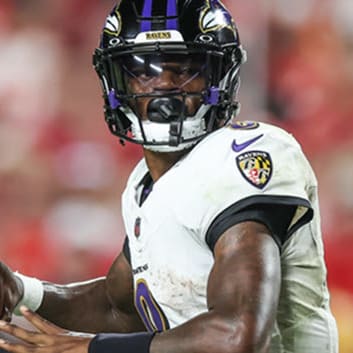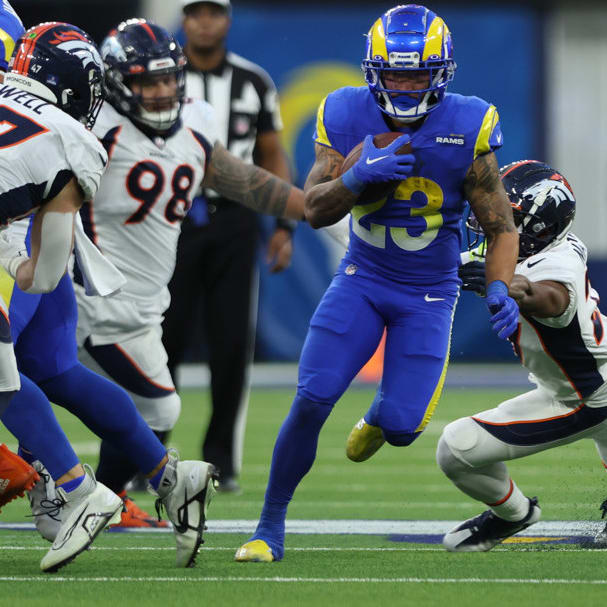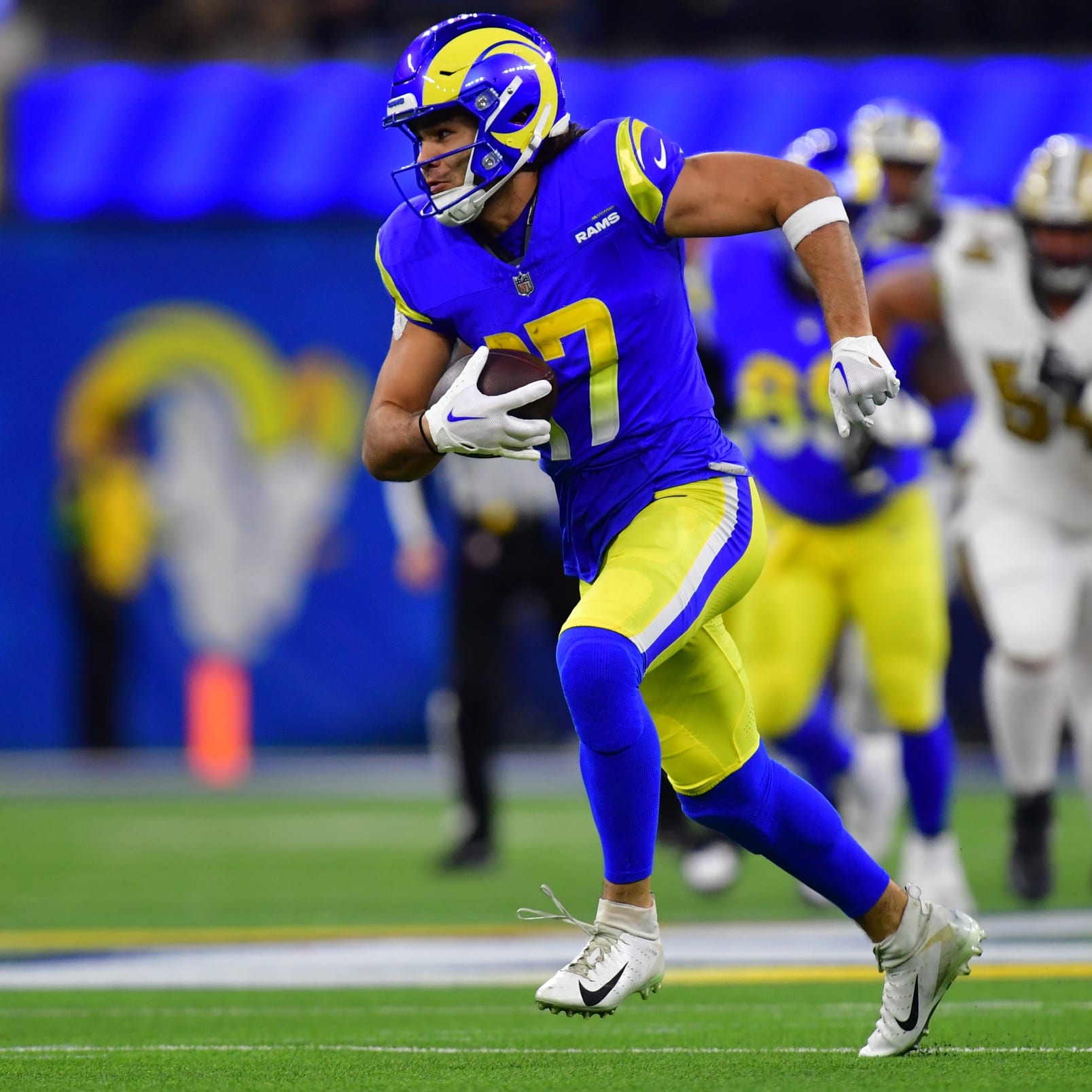This article is part of our NFL Reactions series.
ICYMI, the Bills are trading Stefon Diggs, a 2024 sixth-round pick and a 2025 fifth-rounder to the Texans for a 2025 second-round pick (originally acquired from the Vikings). The move leaves Buffalo with a $31.096 million dead cap charge, which some have inaccurately characterized as the Bills "holding money" to get rid of Diggs.
In reality, the $31.096 million entirely consists of bonus money that was already paid out, i.e., it's a sunk cost and merely a matter of whether the cap charge is taken in 2024 or spread over the life of his contract. Trading Diggs accelerates all the bonus-money cap charges for his four-year extension (2024-27) to the current year, but everything that's left in his contract goes to the Texans and there won't be any Diggs-related cap hit for 2025 on Buffalo's cap sheet.
At the end of the day, the Bills paid Diggs about $79 million for four seasons (2020-23), with the cap hit spread out over five years (2020-24). His cap charge was below $15 million in each year he actually played for the team, and Josh Allen's cap charge averaged less than $13 million over the same stretch.
That said, Bills GM Brandon Beane pretty much botched this one, giving Diggs a four-year extension in 2022 (when he still had two years left on his contract) and then trading him before the extension even kicked in for a not-so-impressive return. Remember that the second-round pick comes next year, not this year, which matters even more in light of the 2024 draft class being viewed more favorably than the 2025 group. The return here isn't that much better than what the Chargers got for Keenan Allen, who heads to Chicago with one year and $23.1 million remaining on his contract (in exchange for pick No. 110 in 2024).
Allen was better than Diggs last year, but the latter is a year younger and has contract terms that offer more potential for surplus value. Four years of Diggs might not sound like a good thing, until you realize that none of the money is guaranteed after this season and he's scheduled for $19.6 million or less each year (both in terms of cap hit and real-life compensation). Diggs, of course, won't be happy about that if he balls out in 2024, presumably looking for more money and/or contract guarantees. Still, the contract gives Houston leverage even in that scenario, and it entails zero dead-money charge if he's traded or released after this season.
Update: A) It turns out Diggs had $3.5 million guaranteed for 2025, on top of his full guarantee for 2024 B) The Texans have now taken that $3.5 million, added it to his 2024 salary and wiped out the rest of the contract. So much for my little spiel about surplus value... this couldn't have possibly worked out better for Diggs from a bu$ine$$ perspective. (It's not the first time we've seen a player benefit financially when a team decided to trade him a couple years after signing him to a big extension.)
What's Next for Houston?
The short answer here is 'good things', especially on the offensive side. Diggs, Nico Collins and Tank Dell may well be the top WR trio in the league, and a bench with Noah Brown, John Metchie and Xavier Hutchinson also has an argument as the league's best (I'm assuming Robert Woods will be a cap casualty to save ~$5 million in both real money and cap space, though a pay cut is also possible and would further solidify the excellent depth).
In terms of alignments and formations, I'm not entirely sure what to expect. Dell is by far the smallest among Houston's three standout WRs, yet had easily the deepest aDOT in 2023 (14.3) and took just 21 percent of his snaps from the slot. Collins was in the slot 19 percent of the time, with Diggs at 29 percent for Buffalo (and between 21-31 percent each of his four years with the team).
Personally, I'd favor giving Diggs most of the slot snaps, partially because he has more experience there, partially because he's seemingly lost a step and partially because he'll need to learn a new role regardless of where he plays (whereas Collins and Dell can continue building on their 2023 success under OC Bobby Slowik as the X and Z receivers, respectively).
Digging deeper, pun intended, Diggs caught only six of his 24 targets 20-plus yards downfield last year, compared to 7-of-14 for Dell and an incredible 13-of-19 for Collins, per PFF. In terms of aDOT, Diggs was between 10.1 and 11.3 each year in Buffalo, and Collins has landed between 10.6 and 11.1 each of his three pro seasons.
Regardless of how that shakes out, we can safely assume the Texans will use 11 personnel more than they did last season (60.3 percent - 23rd most). What we shouldn't assume is that they'll rank among the league leaders there, considering they still have FB Andrew Beck and an intriguing second tight end in Brevin Jordan.
The Texans used 12 personnel (two backs) on 20.7 percent of overall snaps last year (fourth most), and it accounted for 16.3 percent of their pass plays at an average of 8.5 yards per pop (including sacks and sack yardage lost). 11 personnel accounted for 72.1 percent of the pass snaps, with the average gain of 6.0 yards (13th) being considerably less impressive.
I don't think Slowik will totally abandon passing from heavier formations, so we'll need to keep a close eye on how those two-wide snaps are divided between the big-three WRs. It might be Dell coming off the field most of the time rather than Diggs, even if the latter is the primary slot guy in three-wide sets. Collins is the least likely to lose snaps there, given his size and his comfort level lining up right on the LOS as an X receiver. It's a role that also minimizes pre-snap motion —something that could contribute to fatigue for Dell and/or Diggs.
Of lesser import, the Diggs addition is cause to lower TE Dalton Schultz's target share and perhaps shave a bit off RB Joe Mixon's. The depth wide receivers, meanwhile, can be dropped in most dynasty leagues where they're rostered, even though Brown had the two massive games last season and Metchie is a recent second-round pick. One or two of those WRs may end up higher up on a depth chart with a new team before Week 1, so hanging on for now isn't the worst idea if you're a Metchie or Hutchinson stan.
STOCK UP: QB C.J. Stroud
STOCK WAY DOWN: WR Tank Dell, WR Stefon Diggs, WR Noah Brown
STOCK MARGINALLY DOWN: WR Nico Collins, TE Dalton Schultz, WRs Metchie/Hutchinson
What's Next for Buffalo?
The Bills clear out $27.3 million in 2025 cap space with the trade, and theoretically they could mess with other contracts to push some money from 2024 into the future and then add talent for the upcoming year. I'm guessing they won't do much of that, if any, as their other offseason moves hint at a reset of sorts. They cut C Mitch Morse, S Jordan Poyer and CB Tre'Davious White early in the offseason, then saw WR Gabe Davis and S Micah Hyde leave in free agency.
The significant deals Buffalo has handed out this offseason were a three-year contract for 26-year-old safety Taylor Rapp, a three-year extension for 30-year-old LT Dion Dawkins and a three-year extension for 28-year-old nickelback Taron Johnson (ages as of Week 1). You can't say they're tanking by any means, but it does kind of look like a less-extreme version of what the Rams did last year, i.e., a subtle acknowledgement that kicking the salary-cap can down the road another year wasn't likely to produce a top roster anyway.
Rather than going all-in again, the Bills are risking a short-term setback with hopes of setting themselves up nicely for Part II of the Josh Allen era in 2025 (or 2026) and beyond. I'm against that sort of thing in most cases, but the Bills were getting awfully close to where the Saints found themselves this offseason -- unable to create major cap space via releases and renegotiations, leaving extensions for players they don't actually want to extend as the only real option for adding a bunch of space.
One of the hidden benefits of the 'reset' thing -- as the Rams found out last year -- is that you inevitably unearth a quality player or three that otherwise wouldn't have gotten much playing time. The downside, of course, is that you also end up giving a bunch of snaps to players that stink.
I'm more worried about the problem of designing an offense without a serious deep threat and without a target-hogging receiver. Losing both Diggs and Davis in one offseason is a big blow, even with the incoming draft class looking quite strong at their position. As things currently stand, the Bills presumably would rank among the league leaders in usage of multi-TE formations, pairing Dawson Knox with Dalton Kincaid rather than trying to run a ton of three-wide stuff with Curtis Samuel + Khalil Shakir + (Insert Rookie Here).
Shakir got just 10.7 percent of his targets 20-plus yards downfield last year, though he did catch five of the six, and Samuel was even lower at 9.4 percent (but also quite efficient, going 5-for-8). Neither guy is slow — Samuel ran a 4.31 40 (in 2017) and Shakir a 4.43 (in 2022) — but both are under 200 pounds and have mostly used their speed to threaten defenses horizontally in the NFL.
Back in 2020 when current Bills OC Joe Brady had the same job in Carolina, Samuel produced career highs for catches (77), receiving yards (851), carries (41) and rushing yards (200), but he wasn't a deep threat (7.3 aDOT) by any means. If Brady's plan is to continue the late-2023 trend of more running plays, it would be wise to add a deep threat like LSU's Brian Thomas or Texas' Xavier Worthy (or Adonai Mitchell) to discourage defenses from overcrowding the box.
They don't necessarily need to trade up for a mega-prospect like Malik Nabers or Rome Odunze who would project to replace most of Diggs' volume, as a spread-the-wealth passing game with Samuel, Shakir, RB James Cook, the two TEs and a rookie deep threat sounds perfectly viable (though perhaps not exhilarating).
From a Josh Allen standpoint, it does seem suboptimal to spread the field less and perhaps put less of the offensive burden on your best player's shoulders. Even more so when said player has a rocket for an arm and is one of the best scrambling QBs around.
Unfortunately, we don't have much of a sample to work with, as Allen got just 26 non-red-zone dropbacks with multiple TEs on the field under Brady, averaging 6.7 yards per play. For the entire season, the sample was 109 dropbacks and a 7.7 average, plus 91 rush attempts at an average clip of 4.2 yards (including QB scrambles). Recall that Knox missed Weeks 8-12 with a wrist injury, missing the last two games under Ken Dorsey and first three under Brady.
As of right now, the offseason looks like a loss for Allen but a win for Kincaid, Samuel and Shakir, with things prone to change if the Bills hit WR hard in the upcoming draft. Stuff like Dawson Knox returning to fantasy relevance or a Mack Hollins spike season still feels extremely low probability even with Diggs and his 10-targets-per-game out of the picture.
Kincaid and Cook are the safest bet to be central figures, albeit in what isn't necessarily a top offense anymore. The Bills took a slight dip last season to sixth in points and fourth in yards, following a three-year run ranking Top 5 in both categories. Another dip is a reasonable expectation, especially if the plan is to run the ball more and give Knox a ton of snaps as the second TE.
STOCK UP: TE Dalton Kincaid, WR Khalil Shakir, WR Curtis Samuel
STOCK DOWN: QB Josh Allen
Diggs 2024 Outlook
Here's an early look at the 2024 player outlook I wrote for Diggs. We'll have these live soon for the top-100 ranked players on the RotoWire site and NFL Draft Kit, with outlooks for lower-ranked players then coming after the draft.
Viewed as one of the safest options on draft boards at this time last year, Diggs had become one of the more polarizing players for 2024 even before the Bills traded him to Houston in early April. He's now looking at top-notch target competition from Texans WRs Nico Collins and Tank Dell, after a mega-slump in the second half of 2023 left Diggs with his worst season-long stat line in four years with the Bills. His nosedive was unexpected, given that the first nine weeks of 2023 were perhaps the most productive stretch of his career (7.8 catches for 92.7 yards and 0.78 TDs on 10.8 targets). The rest of the Bills offense disappointed, however, so the team fired OC Ken Dorsey after Week 10 and replaced him with Joe Brady. Including the playoffs, Diggs had one TD in nine games under Brady and just two performances of more than 52 yards. His 27.3 percent target share in that stretch was ninth in the league and right in line with his 2020-22 usage, but the efficiency nosedived (5.2 YPT) and Buffalo ran the ball more often. That last part shouldn't be an issue in Houston with QB C.J. Stroud now surrounded by arguably the best group of pass catchers in the league. Even so, Diggs is looking at a major plunge in team share stats and is unlikely to match his 10-target-per-game Buffalo usage even if he's taking his slice from a huge passing-game pie. The Texans have TE Dalton Schultz and RB Joe Mixon projecting for a decent number of targets, in addition to Diggs, Dell and Collins competing for the WR looks.












